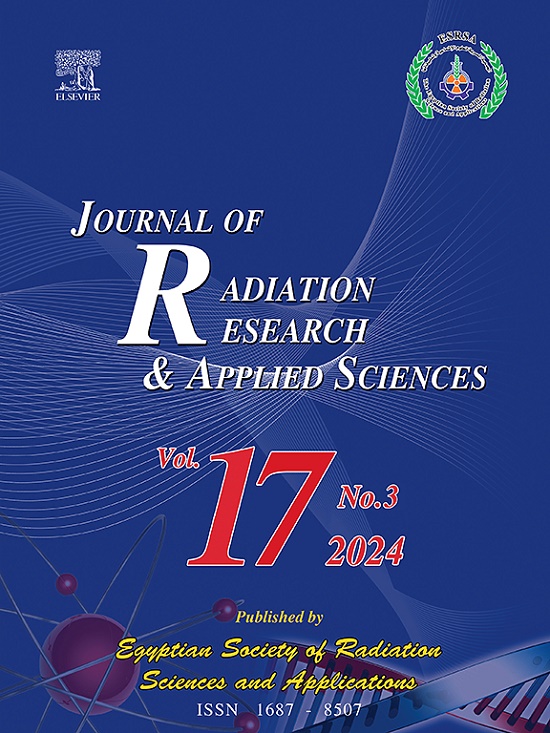The impact of glucose and lipid metabolic parameters in patients with metabolic syndrome on the treatment response of glioblastoma: A retrospective case-control study
IF 1.7
4区 综合性期刊
Q2 MULTIDISCIPLINARY SCIENCES
Journal of Radiation Research and Applied Sciences
Pub Date : 2025-05-21
DOI:10.1016/j.jrras.2025.101589
引用次数: 0
Abstract
Background
Glioblastoma (GBM) is an aggressive brain malignancy with a poor prognosis. The metabolic syndrome, characterized by aberrant glucose and lipid metabolism, may influence GBM treatment outcomes. This study aimed to explore the impact of glucose and lipid metabolic parameters in patients with metabolic syndrome on the therapeutic response of GBM.
Methods
A retrospective case-control study was conducted, involving 228 GBM patients with metabolic syndrome treated from January 2019 to January 2022. Patients were categorized into good and poor response groups based on survival beyond or below 15 months post-treatment. Demographic, clinical, and metabolic data were collected, including blood glucose, lipid profiles, and inflammatory markers. Univariate and multivariate logistic regression analyses identified predictors of treatment response.
Results
Elevated glucose and lipid parameters were associated with poor treatment responses. Mean serum glucose, glycated hemoglobin (HbA1c), and homeostatic model assessment of insulin resistance (HOMA-IR) were higher in the poor response group (P = 0.01, P < 0.001, P = 0.022, respectively), correlating positively with poor outcomes in multivariate analysis. Dyslipidemia, characterized by high triglycerides (TG) and high-density lipoprotein cholesterol (HDL), and low low-density lipoprotein cholesterol (LDL) levels, significantly predicted poorer responses (TG P < 0.001; LDL P = 0.012; HDL P < 0.001). Elevated C-reactive protein (CRP), interleukin-6 (IL-6), tumor necrosis factor-alpha (TNF-α) levels were also linked to worse outcomes, indicating a role of systemic inflammation. Epidermal growth factor receptor (EGFR) amplification was more common in poor responders, while O-6-methylguanine-DNA methyltransferase (MGMT) promoter methylation was linked to better outcomes (P = 0.002 and P = 0.001, respectively).
Conclusion
Dysregulated glucose and lipid metabolism in metabolic syndrome adversely affects GBM treatment response.
代谢综合征患者糖脂代谢参数对胶质母细胞瘤治疗反应的影响:一项回顾性病例对照研究
胶质母细胞瘤(GBM)是一种预后不良的侵袭性脑恶性肿瘤。代谢综合征以异常的糖脂代谢为特征,可能影响GBM的治疗结果。本研究旨在探讨代谢综合征患者糖脂代谢参数对GBM治疗反应的影响。方法采用回顾性病例对照研究,纳入2019年1月至2022年1月收治的228例GBM代谢综合征患者。根据治疗后超过或低于15个月的生存期,将患者分为良好和不良反应组。收集了人口统计学、临床和代谢数据,包括血糖、脂质谱和炎症标志物。单变量和多变量逻辑回归分析确定了治疗反应的预测因素。结果血糖和脂质参数升高与治疗效果差有关。不良反应组平均血糖、糖化血红蛋白(HbA1c)和胰岛素抵抗稳态模型评估(HOMA-IR)较高(P = 0.01, P <;0.001, P = 0.022),在多变量分析中与不良结局呈正相关。以高甘油三酯(TG)和高密度脂蛋白胆固醇(HDL)以及低低密度脂蛋白胆固醇(LDL)水平为特征的血脂异常显著预测较差的反应(TG P <;0.001;LDL p = 0.012;HDL P <;0.001)。升高的c反应蛋白(CRP)、白细胞介素-6 (IL-6)、肿瘤坏死因子-α (TNF-α)水平也与更糟糕的结果有关,表明全身性炎症的作用。表皮生长因子受体(EGFR)扩增在不良应答者中更为常见,而o -6-甲基鸟嘌呤- dna甲基转移酶(MGMT)启动子甲基化与更好的结果相关(P分别= 0.002和P = 0.001)。结论代谢综合征患者糖脂代谢异常影响GBM治疗效果。
本文章由计算机程序翻译,如有差异,请以英文原文为准。
求助全文
约1分钟内获得全文
求助全文
来源期刊

Journal of Radiation Research and Applied Sciences
MULTIDISCIPLINARY SCIENCES-
自引率
5.90%
发文量
130
审稿时长
16 weeks
期刊介绍:
Journal of Radiation Research and Applied Sciences provides a high quality medium for the publication of substantial, original and scientific and technological papers on the development and applications of nuclear, radiation and isotopes in biology, medicine, drugs, biochemistry, microbiology, agriculture, entomology, food technology, chemistry, physics, solid states, engineering, environmental and applied sciences.
 求助内容:
求助内容: 应助结果提醒方式:
应助结果提醒方式:


